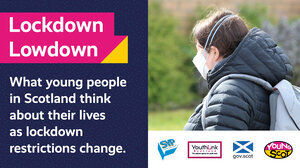Demographic breakdown of young people’s views about long-term impacts of COVID-19 on their lives
In partnership with the Scottish Youth Parliament, and YouthLink Scotland, we’ve published an expanded version of the #LockdownLowdown: ‘What young people in Scotland think about their lives as lockdown restrictions change’ report.
This new report gives a deeper insight into how young people feel about their education, relationships, rights, and more, as lockdown restrictions change.
In recognition that the impact of lockdown will be long-term, the Scottish Government commissioned a follow-on #LockdownLowdown survey that ran between September and November 2020 and received over 6,000 responses. This activity ran alongside focus groups held by the Scottish Youth Parliament with young people whose voices are seldom heard.
In December 2020, we launched the Key Findings Report, providing stakeholders with the top-line results of what young people are worried about, and the long-term impact that COVID-19 is having on their lives.
Some of the key findings include:
When asked if their educational establishment had reopened in a safe way, young people in more affluent areas agreed with this statement more than those in other areas.
Young people aged 11 & 12 were most concerned about missing out on learning or having difficulty with online learning. Respondents over 18 also mostly expressed difficulty with learning online, with much more responses for this theme compared to others.
Male respondents were substantially more likely to agree that they felt good about their mental health & wellbeing (59%) than female respondents (34%) and respondents who identified as non-binary or in a different way (18%).
When asked for any further thoughts on employment, young people who had a long-term illness or disability expressed concern about job security in their industry and the inability/difficulty to find a job slightly more than the other group.
Young carers were less likely to agree that they had a good relationship with their family than others (74% of respondents who were young carers compared with 84% who were not.
When asked if they were happy to be back to learning in person, BAME respondents were less likely to agree than White respondents.

